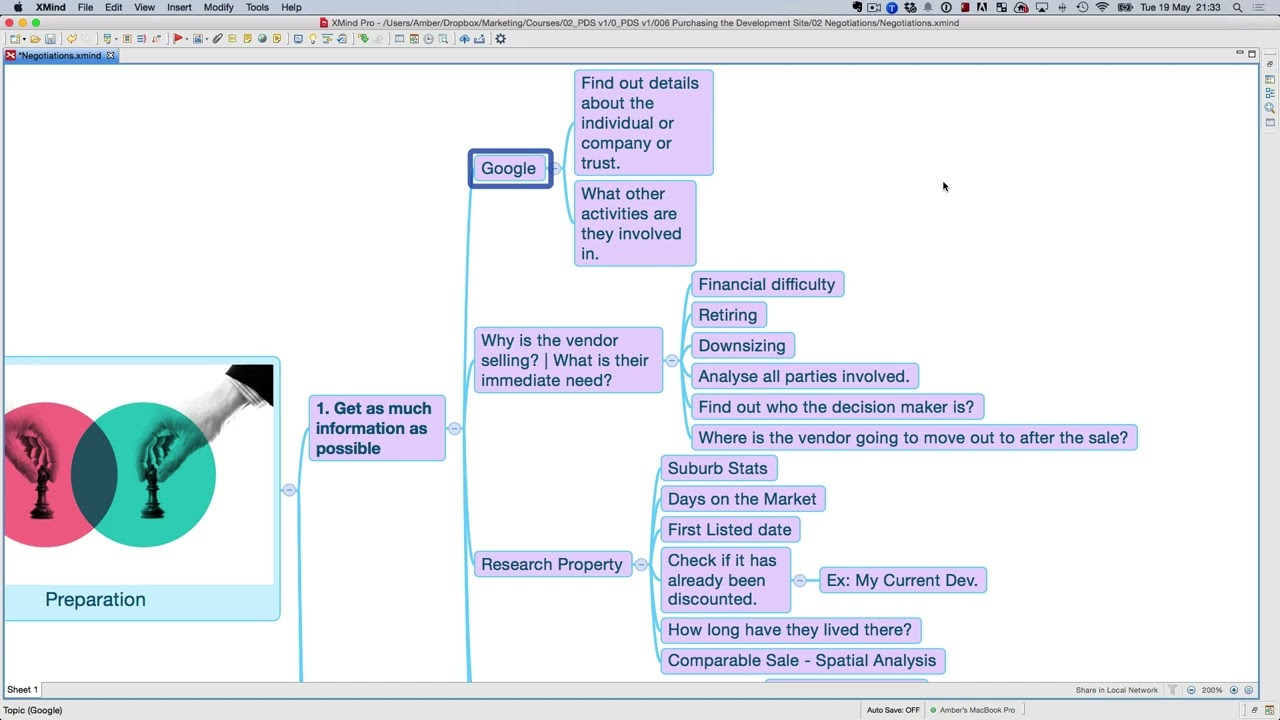Negotiations Overview - 01
Here is a comprehensive guide on the negotiation process crucial for property purchases. It includes -
Preparation
Emphasises the importance of extensive preparation and information gathering. This includes profiling individuals involved in the negotiation and understanding the vendor’s motivations for selling.
Research
Advises on researching the property, understanding its market value, and identifying any potential for price negotiation based on the duration the property has been listed for sale.
Strategy
Highlights the need for a strategic approach to negotiation, suggesting methods to strengthen your position and weaken the opposition’s stance. It covers leveraging information obtained during the research phase to achieve favourable outcomes.
Decision Making
Discusses the criticality of negotiation decision-making, stressing the importance of determining the maximum price you should pay and identifying the real decision-maker in the selling party.
Communication
Underlines the significance of communication tactics, such as encouraging the vendor to reveal more information, inadvertently giving the buyer more power in negotiations.
Frequently Asked Questions
How does understanding the vendor’s motive for selling impact the negotiation process?
Understanding the vendor’s motive for selling significantly impacts the negotiation process in several ways:
Strategic Advantage
Knowing why the vendor is selling provides a strategic advantage. If the seller is in a hurry due to financial difficulty, relocating, or downsizing, the buyer might negotiate a lower price by offering a quick sale.
Customised Offers
Awareness of the vendor’s motives allows the buyer to tailor the offer to address specific needs. For example, if the seller seeks a longer settlement to find a new home, the buyer could accommodate this request in exchange for a reduced sale price.
Psychological Insight
Understanding the seller’s motivations gives the buyer psychological insights into approaching the negotiation. It helps frame conversations and offers in a way that is more likely to appeal to the seller.
Reduced Competition
By directly addressing the seller’s needs, a buyer may reduce competition from other potential buyers who might not be as informed or willing to accommodate the seller’s requirements.
Improved Communication
Knowing the vendor’s reasons for selling enhances communication and builds trust, as the buyer can express empathy and understanding towards the seller’s situation, fostering a more positive negotiation atmosphere.
By leveraging the vendor’s selling motives, buyers can negotiate not only on price but also on terms that could make their offer more appealing, ultimately leading to a successful property purchase.
What are the benefits of profiling individuals involved in the negotiation before meeting them?
Profiling individuals involved in the negotiation before meeting them offers several benefits that can enhance the negotiation process:
Tailored Communication Strategy
Understanding the backgrounds, interests, and potential biases of the individuals involved allows for a tailored communication approach. This can include adjusting the tone, style, and content of the presentation to align with the audience’s preferences, increasing the likelihood of a favourable response.
Anticipate Challenges
Knowing each negotiator’s personalities and potential sticking points helps anticipate challenges and objections. This preparation enables the creation of targeted responses and strategies to overcome these hurdles effectively.
Build Rapport
Insights into the personal interests and professional backgrounds of the individuals can facilitate rapport-building. Mentioning shared interests or mutual connections, for example, can create a more congenial atmosphere conducive to open dialogue and compromise.
Strategic Alliances
Identifying potential allies among the negotiating parties can be crucial. Understanding their motivations and concerns allows for the formation of strategic alliances, which can be leveraged to positively influence the negotiation’s outcome.
Leverage Information
The information gathered through profiling can reveal crucial leverage points. For instance, knowing that a council member prioritises environmental sustainability can guide the presentation of a property development project in a way that highlights its green credentials.
By thoroughly researching and profiling the individuals involved, negotiators can significantly improve their strategic position, enabling them to navigate the negotiation landscape more effectively and achieve better outcomes.
How can a buyer effectively use information about the property’s market history in negotiations?
Effectively using information about the property’s market history in negotiations can significantly benefit the buyer in several ways:
Price Negotiation
Knowing how long the property has been on the market can be a powerful negotiating tool. Properties listed for an extended period might indicate seller fatigue, providing an opportunity to negotiate a lower price.
Understanding Seller Motivation
The market history can give clues about the seller’s motivation. For example, a recent listing might suggest the seller wants a quick sale. At the same time, a property on the market for months may indicate a seller is open to negotiation to make the sale finally.
Leverage for Terms
Besides price, understanding the property’s listing duration can offer leverage in negotiating favourable terms. This could include requests for repairs, closing costs, or a flexible closing date, especially if the seller is eager to sell.
Market Insight
The history offers insight into the property’s demand and potentially why it has yet to sell. This could be due to price, property issues, or market conditions, which can inform the buyer’s approach and expectations.
Comparative Analysis
Knowing when the property was listed, and any price adjustments made during its market presence allows for a more informed comparative market analysis. This helps assess whether the property is priced reasonably relative to similar properties and market trends.
Why is preparation essential in the negotiation process for buying property?
Preparation is crucial because it involves gathering extensive information about the negotiation and the individuals involved. This includes understanding the seller’s reasons for selling the property, which can give you insights into their motivations and potentially influence the negotiation terms in your favour.
What should be included in the preparation for a property purchase negotiation?
The preparation should include profiling the individuals involved in the negotiation process and understanding the vendor’s motivations for selling. This could include researching the seller’s financial situation, the property’s history, and any factors that might prompt the seller to prefer a quick sale, which could be advantageous in negotiations.
How does researching the property help in negotiations?
Researching the property helps you understand its market value and identifies any leeway for price negotiation. Factors such as how long the property has been listed for sale can indicate the seller’s urgency to sell, which can be leveraged in your favour during negotiations.
What are the key factors to research about a property before entering negotiations?
Key factors include the property’s current market value, how long it has been on the market, any previous offers, the property’s condition, and any market trends that could influence its value. This information can be pivotal in forming a negotiation strategy.
What is the importance of having a strategy in negotiation for a property purchase?
A strategic approach helps to strengthen your position and potentially weaken the seller’s stance. By leveraging information obtained during the research phase, you can craft arguments and offers that align closely with your goals while appealing to the seller’s motivations and constraints.
How can a buyer use their negotiation strategy to achieve favourable outcomes?
A buyer can use their negotiation strategy by identifying the seller’s weaknesses or motivations and tailoring their offers accordingly. This could involve suggesting flexible terms that meet the seller’s needs or presenting information that supports a lower price than the seller initially expected.
Why is decision-making critical in negotiation, and how should it be approached?
Decision-making is critical because it determines the success of the negotiation, including the maximum price you should pay for the property. It involves identifying the real decision-maker in the selling party and understanding your own limits and preferences to avoid overpaying or missing out on a suitable property.
How can a buyer identify the real decision-maker in the selling party?
A buyer can identify the real decision-maker by observing communication patterns, asking direct questions about the decision-making process, and using indirect methods to confirm the individual’s authority to negotiate and make decisions regarding the sale.
What role does communication play in the negotiation process?
Communication is significant in negotiations as it can be used to encourage the seller to reveal more information, which inadvertently gives the buyer more power. Effective communication tactics can lead to better understanding, rapport, and ultimately, more favorable negotiation outcomes.
How can a buyer encourage a vendor to reveal more information?
A buyer can encourage a vendor to reveal more information by asking open-ended questions, showing genuine interest in the property and the seller’s situation, and creating a comfortable environment for the seller to share details. This can uncover valuable insights that can be used in the negotiation.
Test Your Knowledge
1. Why is understanding the seller’s motivation crucial in property negotiation?
A) It can help in setting a higher price for the property.
B) It provides a strategic advantage by tailoring the offer to the seller’s needs.
C) It is only useful for statistical analysis.
D) It simplifies the documentation process.
2. How does researching the property’s market value and listing duration benefit the buyer?
A) It indicates the best color to paint the property.
B) It helps in understanding if the property’s price will increase.
C) It provides leverage for price negotiation and insight into the seller’s urgency.
D) It is only beneficial for the buyer’s real estate agent.
3. Which of the following best describes the benefit of having a negotiation strategy?
A) It allows the buyer to avoid all communication with the seller.
B) It ensures the property is removed from the market faster.
C) It strengthens the buyer’s position and potentially weakens the seller’s stance.
D) It guarantees the seller will accept any offer made by the buyer.
4. Why is identifying the real decision-maker in the selling party critical to negotiation?
A) It ensures the buyer can avoid unnecessary negotiations.
B) It allows the negotiation to be completed without a clear budget.
C) It is important to determine who to send thank you notes to after purchase.
D) It helps target the negotiation efforts effectively and understand limits.
5. What role does effective communication play in the negotiation process?
A) It is solely for the purpose of documenting the transaction.
B) It enables the buyer to encourage the seller to reveal more information, giving the buyer more power.
C) It is not important as long as the buyer has a higher offer.
D) It helps in reducing the property’s value.
Answers:
- B) It provides a strategic advantage by tailoring the offer to the seller’s needs.
- C) It provides leverage for price negotiation and insight into the seller’s urgency.
- C) It strengthens the buyer’s position and potentially weakens the seller’s stance.
- D) It helps in targeting the negotiation efforts effectively and understanding limits.
- B) It enables the buyer to encourage the seller to reveal more information, giving the buyer more power.
Assignment
Negotiation Process for Property Purchases: Practical Exercise
Objective:
To apply the concepts learned about the negotiation process for property purchases through a practical, real-world scenario. This exercise is designed to deepen understanding by engaging with the material in an active and practical way.
Exercise Overview:
You are given the role of a potential buyer interested in purchasing a property. Your task is to navigate the negotiation process from preparation to closing the deal, using the concepts provided in the negotiation overview.
Part 1: Preparation
Research and Profile Creation:
- Identify a real or hypothetical property you are interested in purchasing.
- Create a profile for the seller and any other individuals involved in the negotiation (e.g., real estate agents, lawyers). Consider their potential motivations, backgrounds, and interests.
Vendor Motivation Analysis:
- Based on the property and seller profile, write a brief analysis of the seller’s potential motivations for selling the property.
Part 2: Research
Property Market Value Assessment:
- Conduct research to estimate the market value of your chosen property. Use online real estate platforms, comparative market analysis, and any other resources available to you (hypothetical or real).
- List any factors that might indicate the potential for price negotiation (e.g., duration listed for sale, market trends).
Part 3: Strategy
Developing a Negotiation Strategy:
- Based on your preparation and research, outline a negotiation strategy. Include tactics to strengthen your position and potential ways to address the seller’s motivations and concerns.
- How would you use the information about the property’s market history to your advantage?
Part 4: Decision Making
Determining Your Maximum Price and Conditions:
- Decide on the maximum price you are willing to pay for the property and under what conditions (e.g., after certain repairs are made).
- Identify how you would approach finding out who the real decision-maker is in the selling party.
Part 5: Communication
Communication Plan:
- Draft a communication plan that outlines how you would engage with the seller and other negotiation parties. Include specific tactics to encourage the seller to reveal more information.
- Propose how you would express empathy and understanding toward the seller’s situation to build trust and rapport.
Research Questions:
- What are some common motivations for sellers to put their property on the market?
- How do real estate professionals estimate the market value of a property?
- What are effective negotiation tactics when dealing with a reluctant seller?
To Do:
- Complete each part of the assignment, ensuring to apply the concepts discussed in the negotiation overview.
- Submit a report containing your profiles, analysis, strategy, decision-making process, and communication plan.
- Include answers to the research questions based on your findings.
Submission:
Prepare a comprehensive report based on the tasks above and submit it via mail or comments. Your report should demonstrate a thorough understanding of the negotiation process, the importance of preparation, research, strategy, decision-making, and effective communication in property purchase negotiations.



